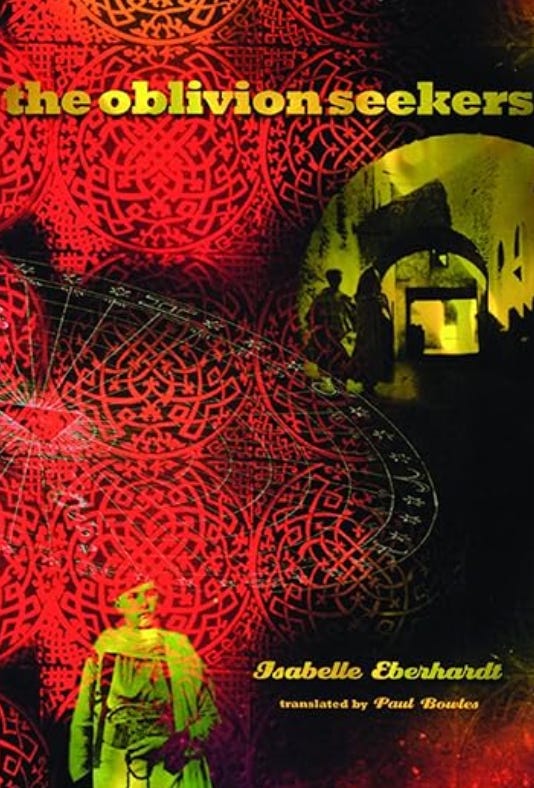A Book I Wish More People Knew About Vol. 10
Isabelle Eberhardt's stories of North Africa, translated by Paul Bowles
Always eclectic, the series “A Book I Wish More People Knew About” stretches this week to North Africa, where Isabelle Eberhardt wrote turn-of-the-century stories and vignettes that were later collected and translated by Paul Bowles. I’m grateful to novelist James Reich for recommending the volume that emerged—The Oblivion Seekers, most recently published by City Lights in 2001.
James’s own work includes the “dizzying” novel The Moth for the Star, praised in Publishers Weekly as “an atmospheric treatise on memory.” It’s out this month from independent publisher 7.13 Books.
A Book I Wish More People Knew About: James Reich on The Oblivion Seekers by Isabelle Eberhardt
Isabelle Eberhardt was born illegitimate and in Dostoevskian circumstances in Geneva, in 1877. Her mother Nathalie, for some time secretly Jewish and yet part of Russian aristocracy by marriage to a general in the army of Tsar Alexander II, fled Saint Petersburg with her lover, Alexandre Trophimowsky. Trophimowsky had been retained by the general as a tutor for his family in the general’s absence, in the belief he was an Armenian cleric of the Orthodox Church. In truth, Trophimowsky was an apostate and a nihilist.
Their daughter Isabelle was prodigiously intelligent and adventurous. Her existential vagabondage in the Sahara, her cross-dressing entry into the male sect of Qadriya Sufism, her sexual liberation, her survival of an assassination attempt which left her seriously wounded, her role in French colonial intrigue, her posthumous writings, and her uncanny death in 1904 as the result of a flash flood in the Algerian city of Ain-Sefra at the age of twenty-seven are the material of legend. Eberhardt’s life was a series of exiles and disappearances.
After the flood, her manuscripts were retrieved from the mud of the ruined house where her body was discovered pinned beneath a fallen roof beam. At the point when I first read Eberhardt, about twenty-five years ago, Paul Bowles’s short, translated collection of her picaresque stories The Oblivion Seekers (1972) was one of the few ways to access her. I was already captivated by Bowles. Bowles—his Sphinx-like alienage in Tangier—was one enigma that led to another.
Bowles was living in Paris when Eberhardt was first brought to his attention in 1931. In a letter, he recalls that he was not particularly impressed by “this woman of whom I’d never heard, who had lived in the desert and died there.” Perhaps he unconsciously resented this young woman who had lost herself in the Sahara almost thirty years before his first visit. In Bowles’s translation of her “Pencilled Notes,” Eberhardt declares, “for no one is free who is not alone.” She anticipates Sartre’s existentialist Hell of No Exit by more than 40 years.
Bowles’s selection of Eberhardt’s work is designed to resonate with her myth. He takes a psychoanalytic and somewhat occult approach. He begins with a compressed biography then proceeds to 13 selections of fiction and nonfiction. These vignettes are haunted by annihilation. They are something like abstract stations of the cross toward Eberhardt’s transfiguration. They concern conversion to Islam, colonialism, sexuality, storms, drowning, the meeting between a Jewish girl and a Moroccan magician, and the languid narcosis and mysticism of the title story. The pieces are riddled with silence and solitude, threaded with morbid longing. And perhaps inevitably, they possess that menacing quality that is Bowles’s signature.
And Eberhardt and The Oblivion Seekers are important to me not least because they shed light on perhaps my favorite novel: Bowles’s The Sheltering Sky (1949). This is most explicit when Kit Moresby, lost in the Sahara, is taken in by Belqassim. She is disguised as a young man and kept in a locked room. Belqassim’s wives and associates become fascinated with and suspicious of his sexual relationship with this handsome youth. The episode from Bowles owes much to Eberhardt’s life.
I think Eberhardt confronts Bowles with something of himself—she is the other person, the precedent. She anticipates him. He looks into her past and discovers something of his own preoccupations, and his style. He must accept that he has been outdone. From Eberhardt’s story, “The Rival”:
There was a shuddering in the essence of things. It was then that the vagrant conceived the idea of waiting, of staying in one place, of being happy. . . . Then everything grew still, and became a part of the immense silence. . . . He abandoned himself to the infinite sweetness of falling asleep alone on the ground, a stranger among simple rough men, in a nameless desert spot to which he would never return.
James Reich is the author of six novels, most recently The Moth for the Star (7.13 Books). Learn more at www.jamesreichbooks.com
Previously in “A Book I Wish More People Knew About”
Vol. 1: The Actual True Story of Ahmed and Zarga, recommended by Phyllis Mann.
Vol. 2: Laura & Emma, recommended by Teddy Wayne.
Vol. 3: The Woman Lit by Fireflies, recommended by Christine Sneed
Vol. 4: This. This. This. Is. Love. Love. Love., recommended by Casey Plett
Vol. 5: The Breaks by Julietta Singh, recommended by Neema Avashia
Vol. 6: The Circus Train by Judith Kitchen, recommended by Beth Kephart
Vol. 7: The Story of the Paper Crown by Józef Czechowicz, recommended by K.E. Semmel
Vol. 8: The Book of the City of Ladies, recommended by Kathleen B. Jones
Vol. 9: At-Risk by Amina Gautier, recommended by Kristen Gentry






I agree that Isabelle is a compelling storyteller and personality. I haven't read Bowles' translation of her stories, but I've read Un Voyage Oriental and it was quite a ride. Her affection for the characters she meets is clear as is their often amused tolerance of her. If they saw through her shape-shifting, they played along with it anyhow. That said, the book reflects some of the racial attitudes of the time.